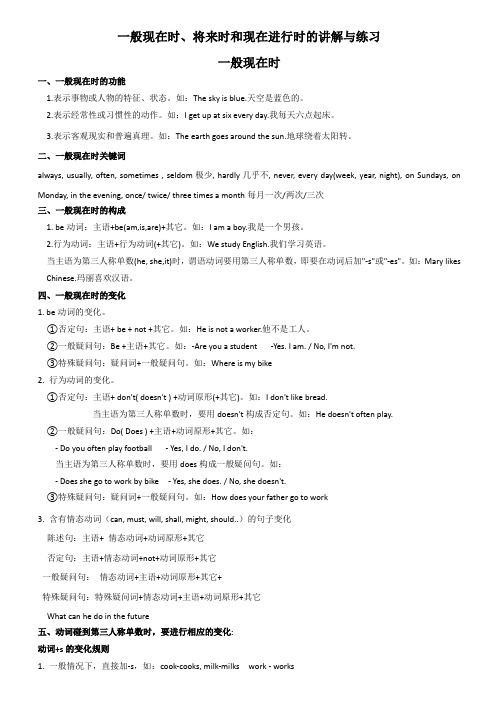新版人教版小学英语语法讲解及习题------一般将来时
人教版英语英语一般将来时知识点梳理及经典练习(超详细)含答案推荐精选

人教版英语英语一般将来时知识点梳理及经典练习(超详细)含答案推荐精选一、初中英语一般将来时1.I Chinese dishes for my foreign friends tomorrow evening.A. will cookB. have cookedC. cookD. cooked【答案】 A【解析】【分析】考查动词时态。
句意:明天晚上我将为我的外国朋友做中国菜。
根据时间状语tomorrow evening可知,句子应该用一般将来时,故选A。
2.—May I speak to Mr. Smith?—Sorry, he _______ Australia. But he _______ in two days.A. has been to; will come backB. has gone to; will be backC. has been in; would come backD. is leaving for; doesn't come back【答案】 B【解析】【分析】考查动词的时态。
句意:——我可以和史密斯先生通话吗?——对不起,他去澳大利亚了。
但是两天后回来。
have gone to“去某地了(还没回来)”;由时间状语in two days可确定第二个空用一般将来时,故答案为B项。
3.Jack ______ a good rest as soon as he finishes the exam.A. hasB. hadC. is havingD. will have【答案】 D【解析】【分析】句意:Jack一完成他的考试就要好好的休息一下。
has第三人称单数形式;had是have的过去式;is having现在进行时态;will have一般将来时态。
have a rest是固定短语,意思是“休息一下”,句中的as soon as引导的是时间状语从句,从句中用一般现在时态,主句用一般将来时态,故答案选D。
人教版英语英语一般将来时知识点梳理及经典练习(超详细)含答案

人教版英语英语一般将来时知识点梳理及经典练习(超详细)含答案一、初中英语一般将来时1.I'm not sure if Lily_______ me. If I _______, I will go with you.A. will invite, will be invitedB. will invite, am invitedC. invites, will inviteD. invites, invite【答案】 B【解析】【分析】句意:我不知道他是否会邀请我,如果我被邀请,我将和你一起去。
题文出现两个从句,第一个是if引导的宾语从句,第二个是if引导的条件状语从句。
根据句意,宾语从句应用一般将来时,条件状语从句中,主句用一般将来时,从句用一般现在时。
故选B。
【点评】考查动词的时态和语态。
2.— Let's go fishing if it this weekend.— But nobody knows if it .A. is fine; will rainB. will be rain; rainsC. will be fine; will rainD. is fine; rains 【答案】 A【解析】【分析】句意:——如果这个周末晴天我们去钓鱼吧。
——但是没人知道是否会下雨。
第一个空前的if引导条件状语从句,意思是“如果”,从句中用一般现在时表示将来;第二个空前的if引导宾语从句,意思是“是否”,根据从句的tomorrow可知用一般将来时;故选A。
【点评】考查动词的时态。
3.—Tom wants to know if you ________ a picnic next Sunday.—Yes. But if it ________, we'll visit the museum instead.A. will have; will rainB. have; rainsC. have; will rainD. will have; rains 【答案】D【解析】【分析】句意:汤姆想知道下周日你们是否去野炊。
六年级英语下册知识讲义-一般将来时以及情态动词can-人教版(五四学制)

一、学习目标1. 能够基本把握一般将来时的相关构成及用法。
2. 基本上能够理解情态动词can的两大用法。
二、重点、难点1. 一般将来时be going to 和will 之间的区别和联系。
2. 情态动词can在不同语境中的含义分析。
三、考情分析这两点在中考试题中都是非常重要的知识点,可以说每年都有所考查。
单选题、完成句子题都有它们的身影,而且在阅读和完形题中也会存在。
1. 一般将来时的概念及相关用法【教材原句】What are you going to do at the weekend? 你周末打算做什么?【概念】be going to do表示自己打算做某事、计划做某事或有意做某事。
【结构】主语+ be going to + do在变句练习中我们应该注意这里面存在的是be动词的变化。
根据“情助be实”四步变句法,应该在be动词上面进行变化。
We are going to have a picnic.We are not going to have a picnic.Are we going to have a picnic?Yes, we are. /No, we aren’t.当然,如果我们到了初二,学习了不定式的用法,此种结构实际上可以理解为be going 加上一个动词不定式结构。
【用法1】表示主体现在打算在最近或将来要做的某事。
这种打算往往是事先就已经考虑好了的。
【例句】My sister is going to learn German next month.我妹妹下个月起要学习德语。
My friend is going to stay for a week.我的朋友准备待一个星期。
【用法2】表示说话人根据已经有了的迹象来推断某件事情极有可能发生。
【例句】Look at the black clouds! It’s going to rain!看那些乌云,要下雨了。
【拓展】大家应该注意到的是,be going to也可以用来讨论自己对于未来状态的一种计划。
专题10 一般将来时_备战2021年小升初英语必考语法和题型(解析版)

专题10 一般将来时一、一般将来时的概念一般将来时表示将来某个时间要发生的动作或存在的状态。
如:I am going to play football tomorrow.我明天打算去踢足球。
Amy will be 12 years old next year. 艾米明年计12岁了。
There will be a football match in our school next week. 我们学校下周将举行一场足球比赛。
二、一般将来时的动词结构①主语+be going to + 动词原形+其它。
②主语+will + 动词原形+其它。
三、一般将来时的句式结构1. 含有be going to的句型(1) 肯定句:主语+ be going to +动词原形+其他。
如:I'm going to have a picnic this afternoon. 今天下午我将要去野餐。
(2) 否定句:主语+be+ not going to +动词原形+其他。
如:I'm not going to have a picnic this afternoon. 今天下午我将不去野餐。
(3) 一般疑问句:Be +主语+ going to +动词原形+其他?肯定回答:Yes, 主语+be.否定回答:No, 主语+ be + not. 如:例:I am going to have a picnic this afternoon. 我今天下午要去野餐。
(改为一般疑问句并作回答) —Are you going to have a picnic this afternoon? 你今天下午将要去野餐吗?—Yes, I am. 是的,我要去。
—No, I’m not. 不,我不去。
(4) 特殊疑问句:特殊疑问词+一般疑问句?What are you going to do tomorrow? 你明天将要去做什么?例:Sam is going to have a birthday party this Friday. 山姆这周五将有一个生日派对。
一般将来时(课件)人教PEP版英语六年级下册

时间状语
tomorrow 系列: tomorrow morning tomorrow afternoon tomorrow evening the day after tomorrow at 7:00 tomorrow morning
next 系列:
next time
next day
next week
A. are going B. are going to C. is going to
( C )3. We are going to cook some fish _____.
A. yesterday
B. last night
C. next weekend
( A )4. _____ you _____ TV every day?
A. Do; watch
B. Are; watching
C. Did; watch
( B )5. He _____ films tomorrow evening.
A. is watching B. is going to watch
C. watched
( C )6. Look!The girls _____ on the bridge over there.
一、一般将来时的用法 一般将来时表示将来某一时刻的动作或状态,或将来某一段 时间内要发生的动作或事情。 时间标志词:this afternoon, this evening, tomorrow, tomorrow+ 时间, the day after tomorrow, next+time/day/week/year … 等。 如: It is going to rain tomorrow. 明天将会下雨。
小学阶段英语语法一般将来时态讲解及练习完整ppt课件

完整版课件
3
一般将来时的定义:
一般将来时表示在将来时间将要发生的动作 或存在的状态,与表示将来的时间连用。 tomorrow, next day(week, month, year…),
this morning, this afternoon, tonight 等。如: She is going to visit her grandparents tonight.
完整版课件
5
二、改写同义句。
• 1.I am going to take a trip this weekend.
• I will take a trip this weekend .
• 2.He is going to see a film with his friend.
• He will see a film with his friend .
We are going to the zoo.
We are going to see a film.
This is my holiday. H完整o版w课件about you?
8
此课件下载可自行编辑修改,供参考! 感谢您的支持,我们努力做得更好!
2. My brother _is__g_o_in_g__to__g_o____ (go) to Shanghai next week.
3. Tom often __g_o_e_s_____ (go) to school on foot. But today is raining, he ___is_g_o_i_n_g______ (go) to school by bike.
英语人教版3-6年级语法时态分类

英语人教版3-6年级语法时态分类
根据人教版英语教材,以下是3-6年级语法时态的分类:
1. 一般现在时(Simple Present Tense):
- 表示经常性或习惯性的动作,事实或真理
- 表示现阶段的状态或常态
2. 现在进行时(Present Continuous Tense):
- 表示正在进行的动作
3. 一般过去时(Simple Past Tense):
- 表示过去发生的动作或情况
4. 过去进行时(Past Continuous Tense):
- 表示过去正在进行的动作
5. 一般将来时(Simple Future Tense):
- 表示将来发生的动作或情况
6. 现在完成时(Present Perfect Tense):
- 表示过去发生的动作对现在产生的影响或结果
7. 过去完成时(Past Perfect Tense):
- 表示过去某个时间已经完成的动作或情况,比过去发生的另一个动作更早发生的动作
8. 将来完成时(Future Perfect Tense):
- 表示将来某个时间已经完成的动作或情况,比将来发生的另一个动作更早发生的动作。
一般现在时-将来时和现在进行时的讲解与练习

一般现在时、将来时和现在进行时的讲解与练习一般现在时一、一般现在时的功能1.表示事物或人物的特征、状态。
如:The sky is blue.天空是蓝色的。
2.表示经常性或习惯性的动作。
如:I get up at six every day.我每天六点起床。
3.表示客观现实和普遍真理。
如:The earth goes around the sun.地球绕着太阳转。
二、一般现在时关键词always, usually, often, sometimes , seldom极少, hardly几乎不, never, every day(week, year, night), on Sundays, on Monday, in the evening, once/ twice/ three times a month每月一次/两次/三次三、一般现在时的构成1. be动词:主语+be(am,is,are)+其它。
如:I am a boy.我是一个男孩。
2.行为动词:主语+行为动词(+其它)。
如:We study English.我们学习英语。
当主语为第三人称单数(he, she,it)时,谓语动词要用第三人称单数,即要在动词后加"-s"或"-es"。
如:Mary likes Chinese.玛丽喜欢汉语。
四、一般现在时的变化1. be动词的变化。
①否定句:主语+ be + not +其它。
如:He is not a worker.他不是工人。
②一般疑问句:Be +主语+其它。
如:-Are you a student -Yes. I am. / No, I'm not.③特殊疑问句:疑问词+一般疑问句。
如:Where is my bike2. 行为动词的变化。
①否定句:主语+ don't( doesn't ) +动词原形(+其它)。
如:I don't like bread.当主语为第三人称单数时,要用doesn't构成否定句。
- 1、下载文档前请自行甄别文档内容的完整性,平台不提供额外的编辑、内容补充、找答案等附加服务。
- 2、"仅部分预览"的文档,不可在线预览部分如存在完整性等问题,可反馈申请退款(可完整预览的文档不适用该条件!)。
- 3、如文档侵犯您的权益,请联系客服反馈,我们会尽快为您处理(人工客服工作时间:9:00-18:30)。
新版人教版小学英语语法讲解及习题------一般将来时
一、概念
表示将要发生的动作或存在的状态及打算、计划或准备做某事。
句中一般有以下时间状语:tomorrow, next day(week, month, year…), soon, the day after tomorrow(后天)等。
二、基本结构
①be going to + do
②will+ do
三、否定句
在be动词(am, is, are)后加not或情态动词will后加not或直接用won’t。
如:
I’m going to have a picnic this afternoon.
→I’m not going to have a picnic this afternoon.
I will go to have a picnic tomorrow.
→I will not/won't go to have a picnic tomorrow.
四、一般疑问句
be或will提到句首,some改为any, and改为or,第一二人称互换。
如:
We are going to go on an outing this weekend.
→ Are you going to go on an outing this weekend?
五、对划线部分提问。
一般情况下,一般将来时的对划线部分有三种
情况。
1. 问人。
Who如:
I’m going to New York soon.
→Who’s going to New York soon?
2. 问干什么。
What如:
My father is going to watch a race with me this afternoon. →What is your father going to do with you this afternoon?
3. 问什么时候。
When如:
She’s going to go to bed at nine.
→When is she going to bed?
六、同义句
be going to = will 如:
I am going to go swimming tomorrow.
= I will go swimming tomorrow.
练习:
填空。
1. 我打算明天和朋友去野炊。
I _______ _______ _______ have a picnic with my friends.
I _______ have a picnic with my friends.
2. 下个星期一你打算去干嘛? 我想去打篮球。
What _______ _______ _______ _______ _______ next Monday? I _______ _______ _______ play basketball.
What _______ you do next Monday? I _______ play basketball.
3. 你妈妈这个周末去购物吗?是,她要去买一些水果。
_______ your mother _______ _______ go shopping this _______? Yes, she _______ . She _______ _______ _______ buy some fruit.
4. 你们打算什么时候见面。
What time _______ you _______ _______ meet?
改句子。
5. Nancy is going to go camping.(改否定)
Nancy _______ going to go camping.
6. I’ll go and join them.(改否定)
I _______ go _______ join them.
7. I’m going to get up at 6:30 tomorrow.(改一般疑问句)
_______ _______ _______ to get up at 6:30 tomorrow?
8. We will meet at the bus stop at 10:30.(改一般疑问句)
_______ _______ meet at the bus stop at 10:30.
9. She is going to listen to music after school.(对划线部分提问)
_______ _______ she _______ _______ _______ after school? 10. My father and mother are going to see a play the day after tomorrow.(对划线部分提问)
_______ _______ going to see a play the day after tomorrow. 用所给词的适当形式填空。
11. Today is a sunny day. We _______ (have) a picnic this afternoon.
12. My brother _______ (go) to Shanghai next week.
13. Tom often _______ (go) to school on foot. But today is rain. He _______ (go) to school by bike.
14. What do you usually do at weekends? I usually _______ (watch) TV and _______ (catch) insects?
15. It’s Friday today. What _______ she _______ (do) this weekend? She _______ (watch) TV and _______ (catch) insects.
16. What _______ (do) you do last Sunday? I _______ (pick) apples on a farm. What _______ (do) next Sunday? I _______ (milk) cows.
17. Mary _______ (visit) her grandparents tomorrow.
18. Liu Tao _______ (fly) kites in the playground yesterday.
19. David _______ (give) a puppet show next Monday.
20. I _______ (plan) for my study now。
